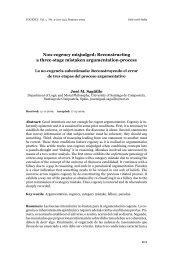Cogency v2 n2
Cogency v2 n2
Cogency v2 n2
Create successful ePaper yourself
Turn your PDF publications into a flip-book with our unique Google optimized e-Paper software.
COGENCY Vol. 2, N0. 2 (41-80), Spring 2010 ISSN 0718-8285<br />
Wittgenstein and the Logic of Deep Disagreement<br />
Wittgenstein y la lógica del desacuerdo profundo<br />
David M Godden<br />
Department of Philosophy, Old Dominion University, Norfolk, Virginia, U.S.A. 23529<br />
dgodden@odu.edu<br />
William H. Brenner<br />
Department of Philosophy, Old Dominion University, Norfolk, Virginia, U.S.A. 23529<br />
wbrenner@odu.edu<br />
Received: 9-3-2010 Accepted: 10-11-2010<br />
Abstract: In “The logic of deep disagreements” (Informal Logic, 1985), Robert Fogelin<br />
claimed that there is a kind of disagreement – deep disagreement – which is, by its<br />
very nature, impervious to rational resolution. He further claimed that these two views<br />
are attributable to Wittgenstein. Following an exposition and discussion of that claim,<br />
we review and draw some lessons from existing responses in the literature to Fogelin’s<br />
claims. In the final two sections (6 and 7) we explore the role reason can, and sometimes<br />
does, play in the resolution of deep disagreements. In doing this we discuss a<br />
series of cases, mainly drawn from Wittgenstein, which we take to illustrate the resolution<br />
of deep disagreements through the use of what we call “rational persuasion.”<br />
We conclude that, while the role of argumentation in “normal” versus “deep” disagreements<br />
is characteristically different, it plays a crucial role in the resolution of both.<br />
Keywords: deep disagreement, Robert Fogelin, form of life, reason, Weltbild, Ludwig<br />
Wittgenstein.<br />
Resumen: En “The logic of deep disagreements” (Informal Logic, 1985), Robert<br />
Fogelin sostuvo que hay un tipo de desacuerdo –el desacuerdo profundo– que es, por<br />
su misma naturaleza, impermeable a la resolución racional. Sostiene además que estas<br />
dos perspectivas son atribuidas a Wittgenstein. Siguiendo una exposición y discusión<br />
de esta perspectiva, reseñamos y obtenemos algunos aprendizajes de las respuestas<br />
existentes en la literatura a la perspectiva de Fogelin. En las dos últimas secciones<br />
(6 y 7) exploramos el rol que la razón puede, y a veces en efecto lo hace, jugar en la<br />
resolución de desacuerdos profundos. Para realizar esto discutimos una serie de ca-<br />
41








